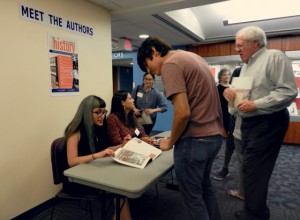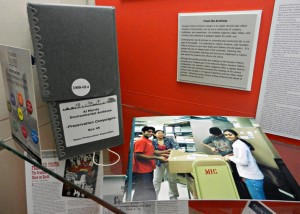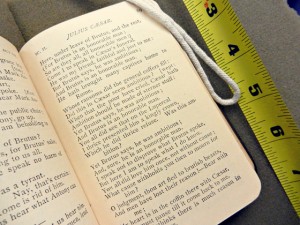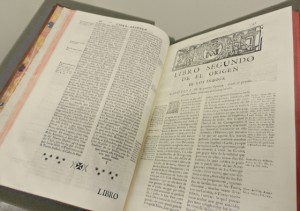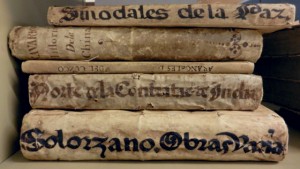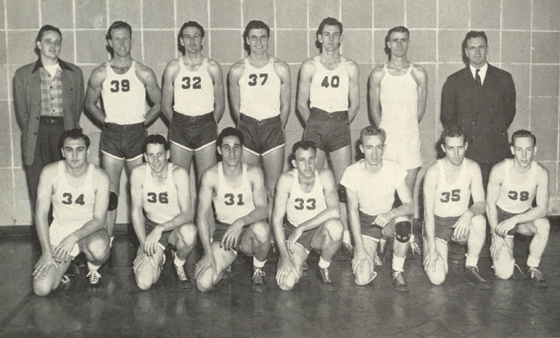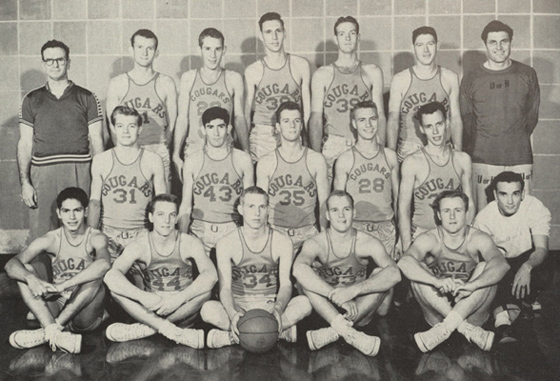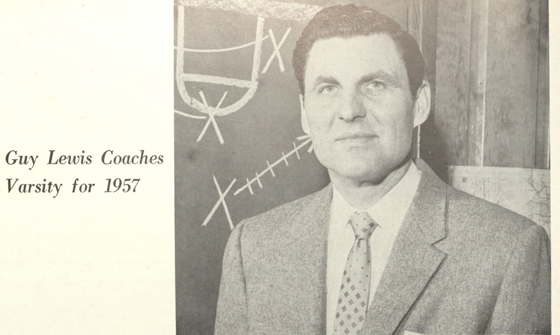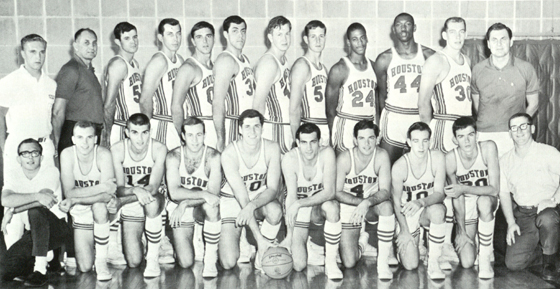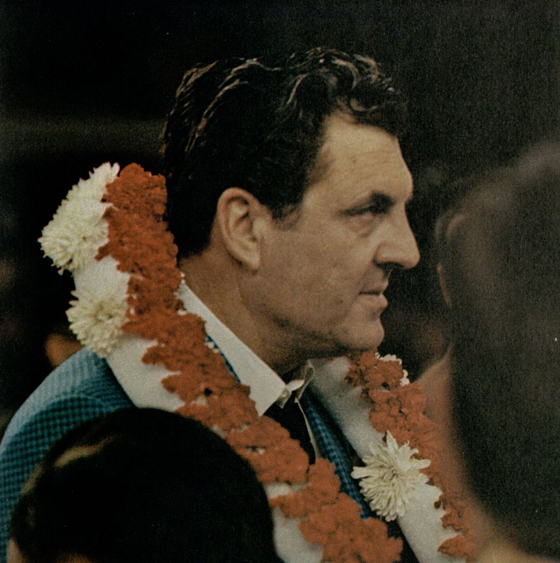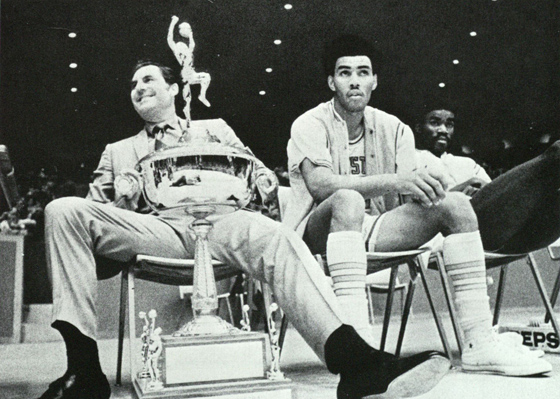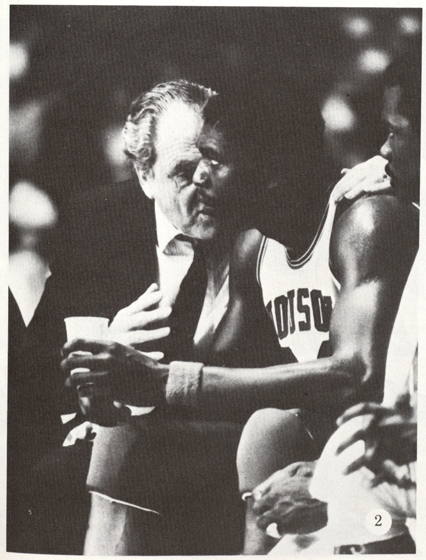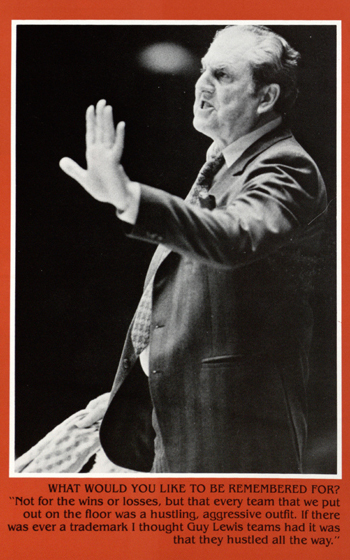
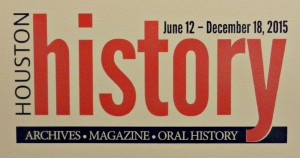 Now is your last chance to catch the exhibition, Houston History: Archives, Magazine, and Oral History on the first floor of the M.D. Anderson Library. Scheduled to close on December 18, 2015, staff will begin striking the exhibition any day now as we make way for a new installation, Encuentros en Literatura | Encounters and Discoveries in Literature, scheduled to open late January 2016.
Now is your last chance to catch the exhibition, Houston History: Archives, Magazine, and Oral History on the first floor of the M.D. Anderson Library. Scheduled to close on December 18, 2015, staff will begin striking the exhibition any day now as we make way for a new installation, Encuentros en Literatura | Encounters and Discoveries in Literature, scheduled to open late January 2016.
The exhibit, now ending a successful six month run, explores the impact of the Welcome Wilson Houston History Collaborative (formerly known as the Houston History Project) on research and scholarship related to Houston’s history. Dr. Tomkins-Walsh, curator of the exhibit and Archivist for the Houston History Archives, explains that in 2003 Dr. Joseph Pratt helped migrate the Houston History magazine from the Houston Public Library to the University of Houston and, in doing so, established an archive and repository of oral histories to complement the publication and help spur future research.
The Houston History magazine, published triannually, is the most prominent and publicly visible organ of the Welcome Wilson Houston History Collaborative. Students help support the day-to-day work of publishing the magazine but, even more importantly, students find a vehicle for publication of their research, often conducted in the archives and oral histories of the Houston History Archives. Dr. Tomkins-Walsh’s exhibition features prime examples of this type of student research and contributing authors even attended the exhibition’s opening, allowing them to highlight their research to a different audience and in a different context.
The Oral Histories from the Houston History Project are produced throughout the year by faculty and graduate students and prepared for online and global access by researchers via our Digital Library. The resource is constantly growing as new oral histories are produced and introduced into the existing collection. Included among the oral histories are interviews related to the energy history of Houston, the construction of the Houston Ship Channel, as well as the fallout from natural disasters like Hurricane Katrina. The Houston History exhibit is able to showcase the under-appreciated and under-publicized role of the oral history interviewer. Through the Center for Public History, graduate students are able to train in the skills, tools, and processes needed to research, prepare for, and conduct successful oral history interviews.
Finally, the paper archives that comprise the Houston History Project are also showcased. Representing a variety of research disciplines, highlights from the archival collections that make appearances in the exhibit include the Foley’s Department Store Records, the Thomas R. Cole Desegregation Papers, and records covering the production of the documentary film, This is Our Home, It Is Not for Sale. A number of other collections like the Bayou Preservation Association and the Citizens’ Environmental Coalition (CEC) provide a window into the peculiar push-pull relationship that developed over the years in Houston between disparate environmental groups and those interested in furthering business development.
However, all good things must come to an end, and time is running out for Houston History: Archives, Magazine, and Oral History. Be sure to catch one last glimpse of this exhibition, while you still can!
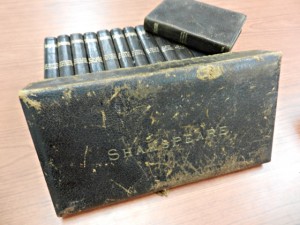
The Handy-Volume Shakespeare (1885)
In addition to the over 7,000 linear feet of archival collections made available for study at the University of Houston Special Collections, we are also proud to offer over 100,000 rare books for use in our reading room. Each month we will highlight an item from our collections and what makes it so special.
Book of the Month: The Handy-Volume Shakespeare (1885)
Why so Special? One hundred thirty years young, this 13 volume set of Shakespeare’s plays, poems, and sonnets are particularly, conveniently sized at a mere 12 x 8 x 2 centimeters (a mere fraction of the size of most devices jangling around in our pockets these days). Those lucky enough to be early adopters of this G. Routledge imprint could conveniently carry a copy (or two) of Mids. N. Dream, Anton. Cleo., or Romeo Ju., depending on one’s appetite. Included in the last volume is a handy glossary, so readers of the late nineteenth century could easily dive into the Bard’s rich language and find that a “lavolta” is indeed, “a spritely dance,” while “tickle-brain” is “some strong intoxicating liquor.”
Location: Anyone interested in viewing these full-course-meals masquerading as morsels of comedy, history, and tragedy are invited to visit the UH Special Collections Reading Room during our normal hours of operation. The Handy-Volume Shakespeare may be called via PR2753 .D2 1885. Magnifying glass available upon request.
The University of Houston Special Collections is pleased to announce the recent donation of the Olive M. Jenney Collection.
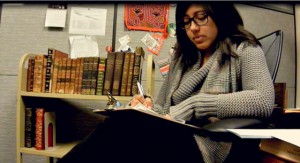
Hispanic Collections Archivist Lisa Cruces discusses the recent donation of the Olive M. Jenney Collection.
This collection of approximately 50 books was acquired by Jenney, a Texas native, throughout her decades spent in Latin America. The books date as far back as 1639 and cover the history of the Spanish exploration of the New World, Spanish interactions with the indigenous populations, and also include materials focusing on Spanish laws and customs relating to the Catholic Church as well as trade with Spanish colonies. The majority of the books are in Spanish and published between the 17th and 19th centuries. Highlights from the collection include a complete set of Antonio de Ulloa and Jorge Juan y Santacilia’s Relación histórica del viaje hecho de orden de su Majestad a la América Meridional (1748), Recopilación de leyes de los Reynos de las Indias (1681), as well as Gregorio Garcia’s Origen de Los Indios de El Nuevo Mundo E Indias Occidentales (1729).
The arrival of the Olive M. Jenney Collection immediately sparked interest from UH faculty. Already in the fall of 2015 we have seen the collection utilized in instruction and coursework related to Latin American environmental history. In the spring of 2016 we look forward to formally introducing the Olive M. Jenney Collection with a celebration and panel discussion, while the books themselves will continue their hard work. Ripe as this collection is with the potential to impact research and instruction, we look forward to expanding the instruction footprint into more Latin American history courses in the spring and are pleased to see Hispanic Studies faculty making early research plans with us for 2016.
Faculty members interested in utilizing these materials for instruction, or those simply interested in more information regarding the Olive M. Jenney Collection, please contact our Coordinator of Instruction, Julie Grob.
University of Houston basketball legend Guy Vernon Lewis II was laid to rest today. Lewis passed away on Thanksgiving, November 26, 2015, in Kyle, TX at the age of 93. To say Houston Cougar basketball is indebted to Coach Lewis is to tiptoe around a libelous understatement. From when he first laced up his sneakers for the Red and White in 1946, through his retirement from coaching in 1986, and into his enduring presence and counsel in his later years, Cougar basketball, athletics, and the University itself were forever changed by his decades of service and devotion. Inducted into the Basketball Hall of Fame in 2013, Lewis saw his teams lay claim to two Southwest Conference championships, four SWC tournament championships, five Final Four appearances, and tally 592 wins under his tenure as head coach of the Cougars.
A snapshot history of Guy V. Lewis and the University of Houston
- 1946: Fresh from his service in World War II, Lewis (#37) begins his playing career with the 1946 Lone Star Conference champion Houston Cougar basketball team. (Houstonian)
- 1953: Lewis (back row, far right) joins the Cougars as an assistant coach. (Houstonian, 1954)
- 1956: Coach Alden Pasche announces his retirement and the University of Houston names Guy V. Lewis as the program’s new head coach. He would serve in that role for the next thirty years. (Houstonian, 1957)
- 1966: While Warren McVea was turning heads for Coach Bill Yeoman’s gridiron Coogs, Lewis (back row, far right) recruits Don Chaney (#24) and Elvin Hayes (#44) were integrating Houston Cougar basketball (Houstonian). For more on UH and Lewis’s role in integrating intercollegiate athletics in the South, see the new book from Robert Jacobus, Houston Cougars in the 1960s: Death Threats, the Veer Offense, and the Game of the Century.
- 1968: Coach Lewis victorious following the Game of the Century (Houstonian). In front of more than 52,000 fans in the Astrodome and millions more on national television (a first for a regular season college basketball game), the #2 Houston Cougars remain undefeated, ending the 47 game winning streak of Coach John Wooden, Lew Alcindor, and the #1 UCLA Bruins. Coach Lewis would call it the greatest thrill of his career.
- 1969: Coach Lewis enjoys the post-tournament ceremonies in the wake of a Cougar victory in the Bluebonnet Classic. (Houstonian, 1970)
- 1977: Coach Guy Lewis shakes hands with President Philip G. Hoffman (right) following victory in the NIT semi-finals. (UH Photographs Collection, Madison Square Garden, NY)
- 1984: Coach Lewis and Hakeem Olajuwon talk strategy. (Houstonian). In the early 1980s Texas’ Tallest Fraternity is born as “Akeem” Olajuwon, Clyde Drexler, Michael Young, and the rest of Phi Slama Jama help propel the Cougars to three straight Final Four appearances from 1982 to 1984. Lewis championed their up-tempo, above-the-rim style noting that slam dunks (once outlawed in college basketball) are “high-percentage shots.”
- 1986: Four decades after his playing days started here, Guy V. Lewis announces his retirement from coaching at the University of Houston. On being asked what he would like to be remembered for, Lewis said, “Not for the wins and losses, but that every team that we put out on the floor was a hustling, aggressive outfit. If there was ever a trademark I thought Guy Lewis teams had it was that they hustled all the way.” (Houstonian)
As work ramps up on the organization, arrangement, and description of the recently accessioned Tatcho Mindiola Papers, Hispanic Collections Archivist Lisa Cruces sat down with PhD candidate Carlos L. Cantú to discuss his early impressions this new collection.
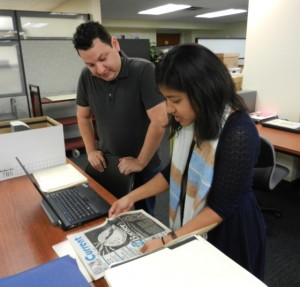
Hispanic Collections Archivist Lisa Cruces (right) and Carlos L. Cantú review materials from the Tatcho Mindiola Papers
Lisa Cruces: What made you interested in working with Tatcho’s Collection?
Carlos L. Cantú: As a former CMAS fellowship alumni and supporter of the work Tatcho Mindiola has done for the Mexican American community, on and off campus, it was exciting to hear that he was donating his papers to the Hispanic Collections at UH. He has a long reputation of helping underserved Mexican Americans achieve academic success. When I learned this was the collection to be processed, I thought it was quite an honor to be a part of it. Playing any role, no matter how small, in helping to make his collection available for the community is a true pleasure for me.
Why do you think it’s valuable to make this material accessible?
Because Tatcho has such a long history of political and activist involvement and has touched so many lives in the process – he really has been involved in many aspects of Mexican American struggles – researchers will find a rich collection of sources including rare documents and pamphlets; and extensive materials on the people, events, and organizations he has worked with in large and small roles. Although the collection will provide great insight on Tatcho’s work, his collection will also provide a rich perspective on the roles, experiences, and contributions of the Mexican American community in not only Houston but around the state and nation.
As a historian, what do you find enjoyable about processing work and working in the archives?
The best part is seeing the collection before anyone else does! And the most enjoyable part is seeing how some of my professors dressed and wore their hair in the 1980s and 90s! But at a more serious level, understanding the process and evolution of a collection provides me more appreciation of the work done behind the scenes. Just as historians search for patterns, develop a chronology, conceptualize an argument, and present their ideas, archivists similarly tell a story; however, it is in its most rawest form – it really is a thoughtful process – which I kind of understood, but I had never been a part of before now.
Anything else you would like to add?
It’s great that he donated his collection to UH. He started his academic career here and he retired here. He is well-known on campus, and around the city and state; hopefully this addition of his paper will garner more attention to the new and growing Hispanic Collections.
Carlos L. Cantú is a PhD candidate in the History Department at the University of Houston, currently working on his dissertation. Cantú is an alum graduate-fellow for the Center for Mexican American Studies at the University of Houston. He graduated with a Bachelor’s in History in 2006 and he received his Master’s in History in 2008, both from the University of Texas-Pan American in Edinburg, Texas. His research examines the social history of education for ethnic groups in the U.S., and primarily looks at their struggles to create and shape community-controlled institutions of higher learning during the late 1960s and 1970s. His dissertation is a comparative history of three community-controlled institutions of higher education, Colegio Jacinto Treviño, a Chicana/o college in South Texas, the Navajo Community College in Arizona, and Hostos Community College in New York City. Preliminary research from his dissertation has appeared in published form and presented at academic conferences.
